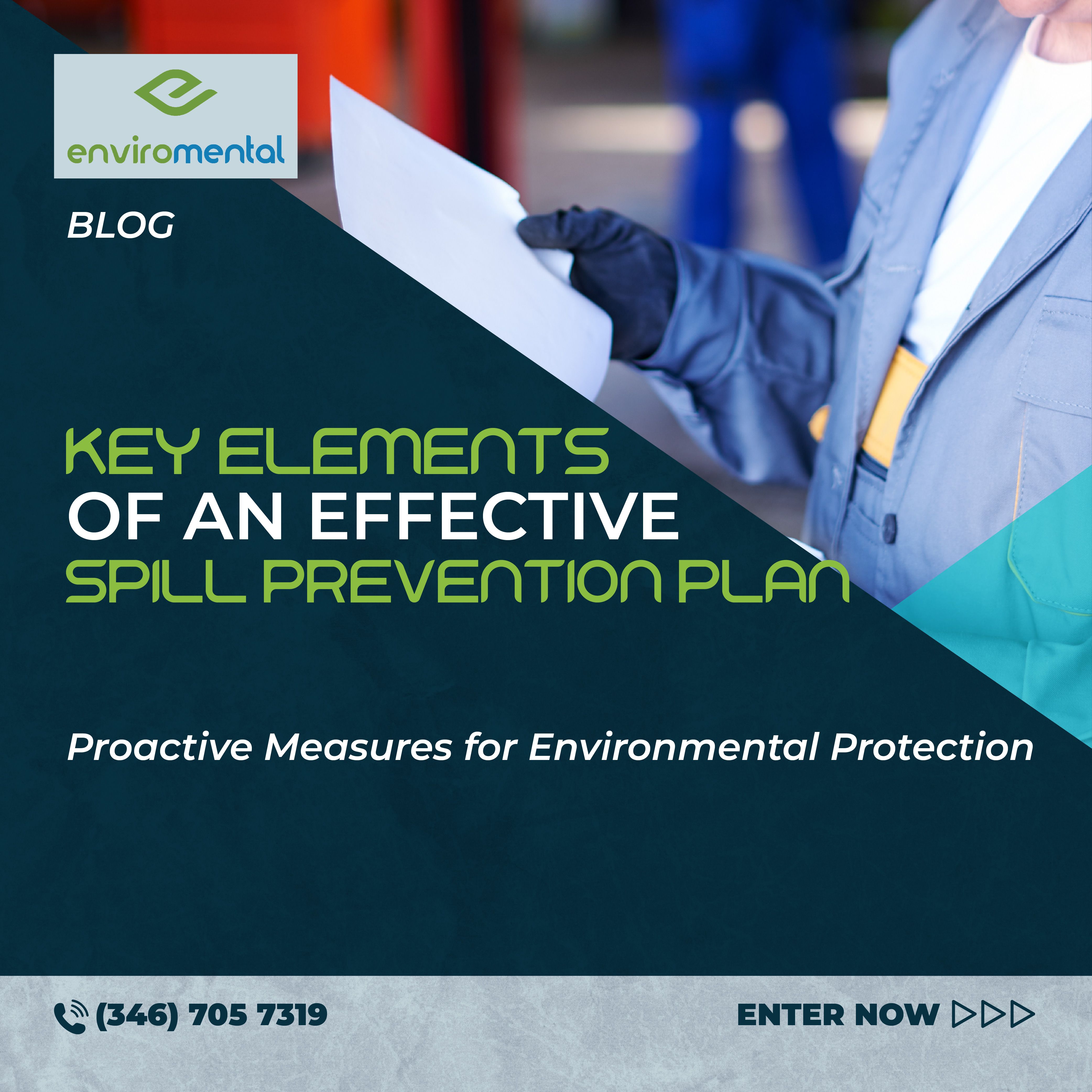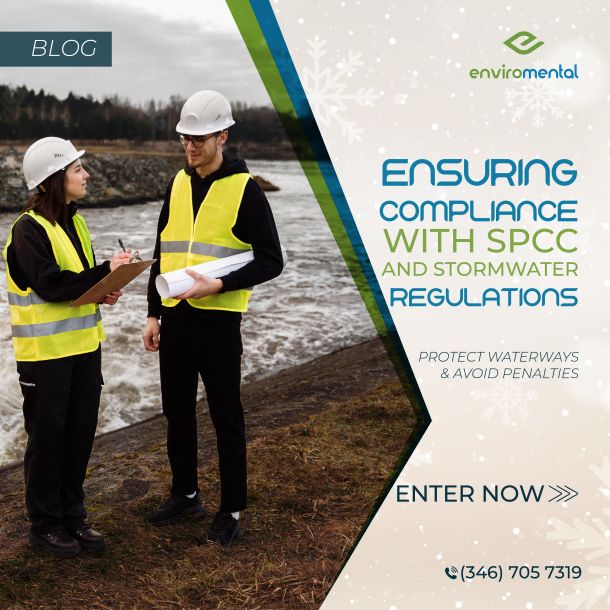-

Stay Updated with the Latest Environmental News – Blog in Texas
Key Elements of an Effective Spill Prevention Plan
Protecting the Environment with Proactive Spill Control Measures
For businesses that handle hazardous materials, having a Spill Prevention, Control, and Countermeasure (SPCC) plan is critical for protecting the environment and avoiding costly fines. An effective spill prevention plan not only ensures compliance with regulations but also helps minimize the risk of environmental contamination. By implementing the right spill prevention strategies, businesses can protect local water sources, reduce pollution, and mitigate risks. In this blog, we’ll cover the essential elements of a successful spill prevention plan.
At Enviro-Mental Corp, we specialize in Texas stormwater pollution prevention and offer businesses comprehensive stormwater management plans that meet regulatory requirements and protect the environment from spills and pollution.
Key Elements of an Effective Spill Prevention Plan
A spill prevention plan is designed to prevent the release of hazardous materials into the environment, particularly through stormwater runoff. Whether your business handles oil, chemicals, or other dangerous materials, having a robust spill prevention strategy is crucial. Below are the key elements to consider when developing an SPCC plan for your business.
- Risk Assessment and Site Evaluation
A comprehensive risk assessment is the foundation of any effective spill prevention plan. Businesses need to evaluate their facilities and identify potential spill points, such as loading docks, storage tanks, or waste disposal areas. A thorough site evaluation allows you to design targeted stormwater pollution control measures that prevent contaminants from reaching storm drains or water bodies. - Spill Containment Systems
One of the most important components of a spill prevention plan is installing spill containment systems. These systems include barriers, secondary containment areas, and spill kits that help contain spills before they spread. By having the right equipment in place, businesses can prevent hazardous materials from contaminating stormwater runoff. - Employee Training and Response Protocols
Proper employee training is essential for preventing spills and ensuring a quick response when they occur. Your team should be trained on spill prevention procedures, how to handle hazardous materials, and how to respond in the event of a spill. Regular training sessions and spill response drills help reinforce your stormwater prevention strategies. - Regular Inspections and Maintenance
Routine inspections of your spill prevention equipment and storage areas are critical to maintaining an effective plan. Regularly inspecting storage tanks, pipelines, and containment systems can help identify potential leaks or weaknesses in your system. Conducting stormwater prevention audits ensures that your facility meets Texas stormwater compliance requirements and stays prepared for potential incidents. - Stormwater Runoff Management
Managing stormwater runoff is a key part of preventing spills from entering local water systems. Implementing stormwater runoff management techniques, such as retention ponds or filtration systems, helps capture and filter runoff before it reaches storm drains. These measures reduce the risk of contaminated stormwater affecting nearby ecosystems. - Recordkeeping and Reporting
Maintaining detailed records of spill incidents, inspections, and training sessions is vital for ensuring compliance with Texas stormwater regulations. Accurate documentation helps track your facility’s performance and ensures that any spill incidents are handled in accordance with regulatory standards.
TIPS for Developing an Effective Spill Prevention Plan
- Identify Potential Spill Risks:
Conduct a thorough site assessment to identify high-risk areas where spills are most likely to occur. Focus on storage tanks, transfer areas, and waste disposal zones. Implement targeted Texas pollution control plans to address these risks. - Install Spill Containment Barriers:
Secondary containment systems such as dikes, berms, and spill pallets help prevent hazardous materials from spreading in the event of a spill. Proper containment is crucial for Texas stormwater pollution control. - Regularly Inspect Spill Prevention Equipment:
Conduct routine inspections to ensure that your spill prevention equipment is functioning correctly. Regular maintenance and stormwater prevention audits are key to maintaining compliance and preventing environmental damage. - Develop a Comprehensive Response Plan:
Ensure that your spill response plan includes detailed procedures for containing and cleaning up spills, as well as communication protocols for notifying regulatory agencies. - Train Employees on Spill Response Protocols:
Regular employee training on spill prevention and response ensures that your team is prepared to act quickly in the event of a spill, minimizing the impact on the environment.
An effective spill prevention plan not only protects the environment but also helps businesses stay compliant with Texas stormwater regulations and avoid costly fines. At Enviro-Mental Corp, we offer expert guidance and tailored solutions to help businesses manage their spill risks and protect local ecosystems. Need help developing or updating your spill prevention plan? Contact us today by filling out our Contact Form or calling (346) 705-7319, and let us know you found us online!
At Enviro-Mental Corp, we are committed to being your go-to resource for environmental management. Our expertise in Texas environmental regulations and management programs makes us the ideal partner for businesses looking to improve their compliance and sustainability efforts. We provide the tools and support you need to comply with all Texas environmental regulations. Trust us to deliver effective and sustainable environmental solutions that drive your business forward.

Texas compliance auditing services, hazardous waste management, Texas hazardous waste compliance, waste management audits, Texas environmental compliance audits, hazardous waste disposal, Texas waste management solutions, regulatory compliance audits, Texas hazardous waste disposal, compliance and waste audits, Texas environmental auditing, waste management compliance, Texas regulatory waste management, hazardous waste assessments, waste compliance programs





